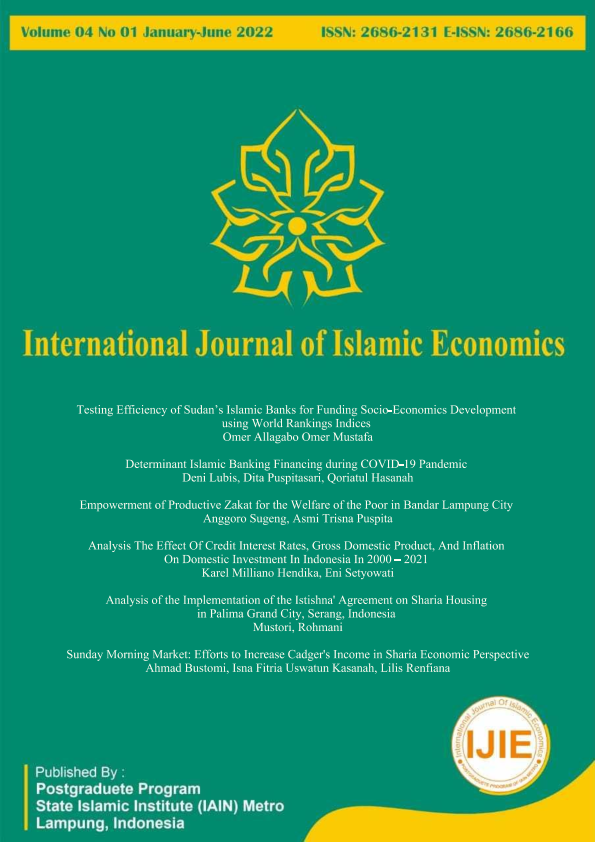Empowerment of Productive Zakat for the Welfare of the Poor in Bandar Lampung City
DOI:
https://doi.org/10.32332/ijie.v4i01.5167Keywords:
Baznas, Poverty, well-being, revolving business capital and productive zakatAbstract
Zakat is one of the pillars of Islam that must be fulfilled by every Muslim. The distribution of zakat is still mostly consumptive and a small part is productive. This study aims to examine the distribution mechanism of productive zakat at BAZNAS Bandar Lampung City as well as to see the effectiveness of productive zakat to alleviate poverty which is equipped with the type of business run by Mustahiq. Collecting data in this study using interview techniques. The interviewees were the III Chairman of BAZNAS Bandar Lampung City, staff and Mustahiq in the Sukarame area of Bandar Lampung. The results of this study indicate that the Mechanism of Productive Zakat Distribution at BAZNAS Bandar Lampung City begins with Looking for Muzakki, Determining Mustahiq, Field Surveys, Providing Business Capital and the final goal is Mustahiq Mandiri. Meanwhile, the increase in Welfare of Mustahiq was felt directly by the respondents after the existence of venture capital from BAZNAS Bandar Lampung City. This is indicated by an increase in income compared to before. Most of the recipients of Revolving Business Capital have businesses in the form of food stalls and a small number have businesses as furniture and furniture craftsmen, craftsmen of shopping bags from used rope materials and other businesses.
Downloads
References
‘Abdullah bin Aḥmad bin Qudāmah. (1988). Al-Kāfī Fī Fiqh Ḥanbal. al-Maktab al-Islāmī.
Aisyah. (2019, July 3). Mustahiq Baznas Kota Bandar Lampung [Personal communication].
Al-Imām al-Ḥāfiẓ al-Mujtahid al-Rabānī Abī ‘abdullah Muḥammad bin al-Ḥasan al-Shaybānī. (1990). Al-Jāmi’ al-Ṣaghīr. Idārah al-Quran wa al-‘ulūm al-Islāmiyyah. https://doi.org/10.1163/2405-4453_alao_com_ala_50030_1_95
Badan Pusat Statistik. (n.d.). Retrieved November 3, 2021, from https://www.bps.go.id/pressrelease/2018/01/02/1413/persentase-penduduk-miskin-september-2017-mencapai-10-12-persen.html
Badan Pusat Statistik Provinsi Lampung. (n.d.). Retrieved November 3, 2021, from https://lampung.bps.go.id/pressrelease/2019/01/15/649/angka-kemiskinan-provinsi-lampung-september-2018.html. https://doi.org/10.36448/jmv.v10i1.2032
Beik, O. I. S. (2009). Analisis Peran Zakat dalam Mengurangi Kemiskinan: Studi Kasus Dompet Dhuafa Republika. Jurnal Pemikiran dan Gagasan: Zakat & Empowering, II, 11. https://doi.org/10.21927/jesi.2019.9(1).30-41
Faizin, M. (2019, July 3). Wakil Ketua III Baznas Kota Bandar Lampung [Personal communication].
Hafidhuddin;, D. (2008). Zakat dalam perekonomian modern, (Jakarta). Gema insani. //perpustakaan.mahkamahagung.go.id/slims/pa-boyolali/index.php?p=show_detail&id=30
Indriyani, A. (2019, July 3). Mustahiq Baznas Kota Bandar Lampung [Personal communication].
Juzay, I. (n.d.). Al-Qawanin al-Fiqhiyah. Dar Al-Fikr.
Moleong, L. J. (2018). Metodologi Penelitian Kualitatif, Edisi Revisi Cet.36. PT Remaja Rosdakarya. https://openlibrary.telkomuniversity.ac.id/pustaka/145777/metodologi-penelitian-kualitatif-edisi-revisi-cet-36.html. https://doi.org/10.52893/peneleh.2020.39.ak
Muhamad. (2000). Sistem dan prosedur operasional bank syariah. UII Press.
Muḥammad Rawwās Qal’ajī. (1989). Mawsū’ah Fiqh ‘umar bin al-Khaṭṭāb. Dār al-Nafāsh.
Nafiah, L. (2015). Pengaruh Pendayagunaan Zakat Produktif Terhadap Kesejahteraan Mustahiq Pada Program Ternak Bergulir Baznas Kabupaten Gresik. El-Qist: Journal of Islamic Economics and Business (JIEB), 5(1), 929–942. https://doi.org/10.15642/elqist.2015.5.1.929-942
Nasrullah, N. (2015). Regulasi Zakat Dan Penerapan Zakat Produktif Sebagai Penunjang Pemberdayaan Masyarakat (Studi Kasus pada Baitul Mal Kabupaten Aceh Utara). INFERENSI: Jurnal Penelitian Sosial Keagamaan, 9(1), 1–24. https://doi.org/10.18326/infsl3.v9i1.1-24
Norvadewi. (2012). Optimalisasi Peran Zakat Dalam Mengentaskan Kemiskinan Di Indonesia. Jurnal Pemikiran Hukum Islam: Mazahib, 10(1). https://journal.iain-samarinda.ac.id/index.php/mazahib/article/view/111. https://doi.org/10.24014/jhi.v19i2.8060
Nurlita, E., & Ekawaty, M. (2018). Pengaruh Zakat Terhadap Konsumsi Rumah Tangga Mustahik (Studi Pada Penerima Zakat Dari Baznas Kota Probolinggo). Jurnal Ekonomi Dan Bisnis Islam (Journal of Islamic Economics and Business), 3, 85. https://doi.org/10.20473/jebis.v3i2.6329
Program Baznas Kota Bandar Lampung. (2019).
Qadir, A. (2001). Zakat: Dalam Dimensi Mahdhah dan Sosial. RajaGrafindo Persada.
Romli. (2019, July 3). Mustahiq Baznas Kota Bandar Lampung [Personal communication].
Rusli, Abubakar Hamzah, dan Sofyan Syahnur. (2013). Analisis Dampak Pemberian Modal Zakat Produktif Terhadap Pengentasan Kemiskinan Dikabupatenaceh Utara. Jurnal Ekonomi Pascasrajana Universitas Syiah Kuala, I(I). https://docplayer.info/37454048-Analisis-dampak-pemberian-modal-zakat-produktif-terhadap-pengentasan-kemiskinan-dikabupatenaceh-utara.html. https://doi.org/10.35794/jpekd.23449.20.01.2019
Sartika, M. (2008). Pengaruh Pendayagunaan Zakat Produktif terhadap Pemberdayaan Mustahiq pada LAZ Yayasan Solo Peduli Surakarta. La_Riba, 2(1), 75–89. https://doi.org/10.20885/lariba.vol2.iss1.art6
T.H.Tambunan, T. (2009). Perekonomian Indonesia: Teori dan Temuan Empiris. Ghalia Indonesia.
Wulansari, S. D., & Setiawan, A. H. (2014). Analisis Peranan Dana Zakat Produktif Terhadap Perkembangan Usaha Mikro Mustahik (Penerima Zakat) (Studi Kasus Rumah Zakat Kota Semarang). Diponegoro Journal of Economics, 3(1), 26–40. https://doi.org/10.26740/jekobi.v4n2.p168-178
Yulia, N. (2019, July 1). Staf Baznas Kota Bandar Lampung [Personal communication].








